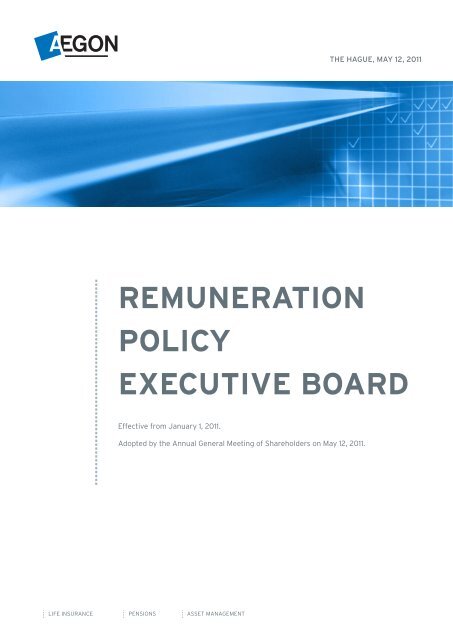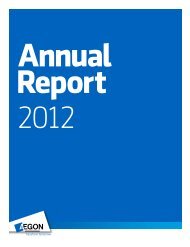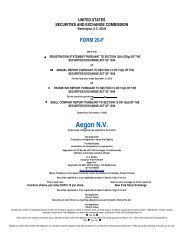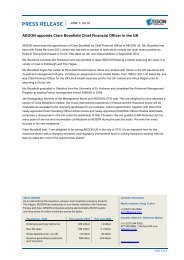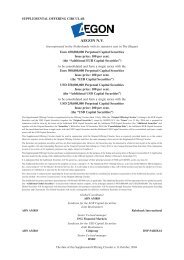Remuneration policy Executive Board 2011 - Aegon
Remuneration policy Executive Board 2011 - Aegon
Remuneration policy Executive Board 2011 - Aegon
Create successful ePaper yourself
Turn your PDF publications into a flip-book with our unique Google optimized e-Paper software.
The Hague, may 12, <strong>2011</strong><br />
REMUNERATION<br />
POLICY<br />
EXECUTIVE BOARD<br />
Effective from January 1, <strong>2011</strong>.<br />
Adopted by the Annual General Meeting of Shareholders on May 12, <strong>2011</strong>.<br />
life insurance pensions asset management
REMUNERATION POLICY EXECUTIVE BOARD<br />
January 1, <strong>2011</strong><br />
1 / 6<br />
1. POLICY<br />
1.1 <strong>Remuneration</strong> Policy<br />
This <strong>Remuneration</strong> Policy outlines the terms and conditions for the employment and remuneration of AEGON<br />
N.V. <strong>Executive</strong> <strong>Board</strong> members. The Policy will be reviewed every year by the Compensation Committee of the<br />
Supervisory <strong>Board</strong>. If and when required, this committee will submit recommendations for changes to the Policy<br />
to the Supervisory <strong>Board</strong>. Any proposed material changes to the Policy will be put up for adoption to the General<br />
Meeting of Shareholders by the Supervisory <strong>Board</strong>.<br />
1.2 Policy term<br />
This Policy will take effect from January 1, <strong>2011</strong>. The Policy will remain in place until such moment the Supervisory<br />
<strong>Board</strong> will adopt changes.<br />
1.3 Application<br />
This Policy applies to members of the AEGON N.V. <strong>Executive</strong> <strong>Board</strong>.<br />
2. TERM OF APPOINTMENT<br />
Members of the <strong>Executive</strong> <strong>Board</strong> will be appointed for four years and may then be reappointed for successive<br />
mandates of four years.<br />
3. COMPENSATION<br />
3.1 Aims and Objectives<br />
The aims and objectives of the <strong>Executive</strong> <strong>Board</strong> <strong>Remuneration</strong> Policy may be summarized as follows:<br />
The <strong>Remuneration</strong> Policy aims to enable the Company to attract and retain highly qualified members for<br />
the <strong>Executive</strong> <strong>Board</strong>.<br />
The Policy seeks to enable the Company to provide a well-balanced and performance-related <strong>Executive</strong><br />
<strong>Board</strong> compensation package, taking into account shareholder interests, relevant European and Dutch<br />
regulations and the public debate on remuneration.<br />
The <strong>Remuneration</strong> Policy will ensure that the interests of <strong>Executive</strong> <strong>Board</strong> members are aligned with the<br />
business strategy and risk tolerance, objectives, values and long-term interests of the Company and will be<br />
consistent with the "pay-for-performance" principle.<br />
Local knowledge. Global power.
REMUNERATION POLICY EXECUTIVE BOARD<br />
January 1, <strong>2011</strong><br />
2 / 6<br />
3.2 Evaluation of Competitive Level<br />
The competitive level of <strong>Executive</strong> <strong>Board</strong> compensation will be monitored against the remuneration of a group of<br />
peer companies on an annual basis.<br />
Companies to be included in the remuneration peer group are selected according to the following criteria:<br />
Industry: preferably life insurance.<br />
Size: assets, revenue and market capitalization.<br />
Geographic scope: preferably companies operating globally.<br />
Location: Europe-based.<br />
The peer group comprises the following companies: Aviva, AXA, CNP Assurances, Generali, ING Group, Legal &<br />
General, Münchener Rückversicherung, Old Mutual, Prudential Plc, Standard Life, Swiss Re, and Zurich Financial<br />
Services.<br />
To monitor alignment with Dutch general industry, an additional reference group has been established, consisting<br />
of Dutch listed companies (AEX Top 12, excluding Financial Services companies).<br />
The Supervisory <strong>Board</strong> will regularly review and where necessary amend the groups to ensure they continue to<br />
provide a reliable basis for comparison.<br />
3.3 Compensation<br />
3.3.1 Compensation Levels<br />
Compensation for <strong>Executive</strong> <strong>Board</strong> members will consist of a Fixed Salary, Variable Incentive Compensation,<br />
Pension, Benefits and Other Arrangements.<br />
For each <strong>Executive</strong> <strong>Board</strong> member, the Supervisory <strong>Board</strong> will determine the appropriate level of compensation,<br />
taking into account the specific role and responsibilities of the individual. For the Fixed Salary, the 2010<br />
compensation levels of the <strong>Executive</strong> <strong>Board</strong> members – adjusted for annual salary adjustments in the AEGON<br />
Nederland N.V. collective labor agreement – will serve as the initial reference point. Each year, the Supervisory<br />
<strong>Board</strong> will review the level compensation to ensure that it continues to be competitive and provides proper and<br />
risk-based incentives to members of the <strong>Executive</strong> <strong>Board</strong>.<br />
The Company requires the <strong>Executive</strong> <strong>Board</strong> members not to use personal hedging strategies or insurance that<br />
could be used to undermine the risk alignment effects embedded in their remuneration arrangements.<br />
Local knowledge. Global power.
REMUNERATION POLICY EXECUTIVE BOARD<br />
January 1, <strong>2011</strong><br />
3 / 6<br />
The Company will not grant any guaranteed Variable Compensation to <strong>Executive</strong> <strong>Board</strong> members, with the<br />
exception of a possible sign-on bonus during the first year of employment.<br />
3.3.2 Total Compensation<br />
Total Compensation for the <strong>Executive</strong> <strong>Board</strong> members is defined as the sum of the Fixed Salary and Variable<br />
Compensation, which consists of an "upfront" and a "deferred" portion. The table below gives the breakdown for<br />
each of these three components; the figures present Fixed and Variable Compensation at maximum level as a<br />
percentage of Total Compensation.<br />
Fixed Compensation<br />
Variable Compensation (at maximum level)<br />
Upfront portion<br />
Deferred portion<br />
50% 20% 30%<br />
The Supervisory <strong>Board</strong> will regularly assess the possible outcomes of Variable Compensation and how it may<br />
affect the remuneration of the <strong>Executive</strong> <strong>Board</strong> members through the execution of a "scenario analysis".<br />
3.4 Fixed Compensation<br />
For each <strong>Executive</strong> <strong>Board</strong> member, the Supervisory <strong>Board</strong> will determine the amount of Fixed Compensation as<br />
part of maximum Total Compensation.<br />
3.5 Variable Compensation<br />
3.5.1 General structure<br />
Variable Compensation will be used to strengthen <strong>Executive</strong> <strong>Board</strong> members’ commitment to the Company’s<br />
business strategy, risk tolerance and long-term performance. In the process of setting and evaluating<br />
performance indicators and targets used for the determination of Variable Compensation, relevant experts, such<br />
as Audit, Compliance, Finance, Human Resources and Risk, are involved.<br />
Variable Compensation is initially granted based on the performance against defined metrics measured during a<br />
one-year accrual period. Part of the total Variable Compensation is paid out directly after the one-year accrual<br />
period ("upfront portion"), whereas the remaining part is deferred over a 3-year period following the accrual<br />
period ("deferred portion"). Vesting of the deferred portion is subject to an ex-post risk adjustment and a<br />
condition of continuous employment.<br />
Local knowledge. Global power.
REMUNERATION POLICY EXECUTIVE BOARD<br />
January 1, <strong>2011</strong><br />
4 / 6<br />
3.5.2 Performance Metrics<br />
Variable Compensation is initially granted based on performance as measured against Group Targets and<br />
Personal Objectives. These objectives represent a mix of financial and non-financial measures, providing an<br />
accurate and reliable reflection of corporate and individual performances. The mix of Group Targets versus<br />
Personal Objectives is 75%-25%.<br />
Group targets, consisting of:<br />
•• 40% Financial targets measuring the performance of the Company on an IFRS basis.<br />
•• 40% Financial targets measuring the performance of the Company on a risk-adjusted basis.<br />
•• 20% Sustainability-related objectives.<br />
Personal Objectives, related to AEGON’s strategy, selected for each <strong>Executive</strong> <strong>Board</strong> member individually.<br />
Each year, a one-year target will be set for each indicator. At the end of the one-year accrual period, a comparison<br />
will be made between the targets and the realized performance. Pay-out of Variable Compensation will be<br />
calculated according to the results of this assessment.<br />
At an aggregate level, pay-out of 50% of the maximum Variable Compensation will occur if the threshold<br />
performance target is reached; matching the pre-set performance target will deliver pay-out of 80% of<br />
the maximum Variable Compensation; outperformance will lead to pay-out of up to 100% of the Variable<br />
Compensation.<br />
3.5.3 Pay-out<br />
After the one-year accrual period, 40% of the awarded Variable Compensation will be paid. The remaining 60%<br />
will be paid out during the subsequent three years, based on tranche vesting after respectively one, two and three<br />
years (i.e. one-third annually). All payments will be done equally (i.e. fifty/fifty) in cash and shares. Pay-out of any<br />
Variable Compensation is conditional upon continued employment.<br />
The number of performance shares at target level is calculated according to the fair value of one share at the<br />
start of that financial year (average share price on NYSE / Euronext Amsterdam during the period from December<br />
15 through January 15).<br />
All shares are conditionally granted. The shares that become unconditional at the moment of vesting, after the<br />
one-year performance period or at the time of deferred pay-out, shall be retained for three more years, with the<br />
exception of shares that may have to be sold to cover income tax obligations resulting from the vesting.<br />
Local knowledge. Global power.
REMUNERATION POLICY EXECUTIVE BOARD<br />
January 1, <strong>2011</strong><br />
5 / 6<br />
3.5.4 Ex-post Assessment<br />
The Supervisory <strong>Board</strong> will apply an ex-post risk assessment to deferred pay-outs of Variable Compensation<br />
in order to determine whether conditionally awarded (i.e. unvested) Variable Compensation should become<br />
unconditional (i.e. will vest) or should be adjusted. This ex-post assessment will be based on informed judgment<br />
by the Supervisory <strong>Board</strong>, taking into account significant and exceptional circumstances that are not (sufficiently)<br />
reflected in the initially applied performance indicators.<br />
Implementation of this authority will be on the basis of criteria such as:<br />
Significant downturn in the Company’s financial performance.<br />
Significant failure in risk management.<br />
Significant changes in the Company's economic or regulatory capital base.<br />
The Supervisory <strong>Board</strong> will ask the Compensation Committee to review these criteria in detail at each moment<br />
of vesting and document its findings. Based on this analysis, the Committee may then put forward a proposal to<br />
the Supervisory <strong>Board</strong> to adjust unvested Variable Compensation. Deferred Variable Compensation may only<br />
be adjusted downwards. Ex-post, risk-based assessments concern deferred Variable Compensation, not Fixed<br />
Compensation.<br />
3.5.5 Claw back<br />
The Supervisory <strong>Board</strong> will have the authority to re-claim ("claw back") any vested pay-outs of Variable<br />
Compensation in case of material financial restatements or individual gross misconduct.<br />
3.6 Pensions<br />
<strong>Executive</strong> <strong>Board</strong> members will be offered pension arrangements and retirement benefits in line with local<br />
practices in their countries of residence and consistent with those provided to executives of other multinational<br />
companies in those countries.<br />
3.7 Benefits and Other Arrangements<br />
<strong>Executive</strong> <strong>Board</strong> members will receive other benefits based on their contractual agreements, local practices and<br />
comparable arrangements for executives of other multinational companies.<br />
The Company will not grant <strong>Executive</strong> <strong>Board</strong> members any personal loans, guarantees or the like, unless in the<br />
normal course of business and on terms applicable to all personnel, and only with Supervisory <strong>Board</strong> approval.<br />
Local knowledge. Global power.
REMUNERATION POLICY EXECUTIVE BOARD<br />
January 1, <strong>2011</strong><br />
6 / 6<br />
4. TERMINATION OF EMPLOYMENT<br />
Employment contracts for new members of the <strong>Executive</strong> <strong>Board</strong> shall contain a notice period of three months for<br />
the <strong>Executive</strong> <strong>Board</strong> member and six months for the Company. Termination arrangements (in all circumstances,<br />
including change-of-control) will conform to the Dutch Corporate Governance Code and Dutch law. The maximum<br />
severance payment for members of the <strong>Executive</strong> <strong>Board</strong> is, if the employment contract is terminated or cancelled<br />
upon request of the Company, one year's gross Fixed Compensation.<br />
5. EXISTING CONTRACTUAL ARRANGEMENTS<br />
As far as existing contractual arrangements of (current) <strong>Executive</strong> <strong>Board</strong> members do not comply with this <strong>policy</strong>,<br />
the Supervisory <strong>Board</strong> will take action as deemed appropriate.<br />
6. VERIFICATION<br />
All calculations made to determine compensation under this Policy shall be verified by both independent external<br />
auditors and the Supervisory <strong>Board</strong>’s Audit Committee.<br />
Local knowledge. Global power.
Local knowledge. Global power.


